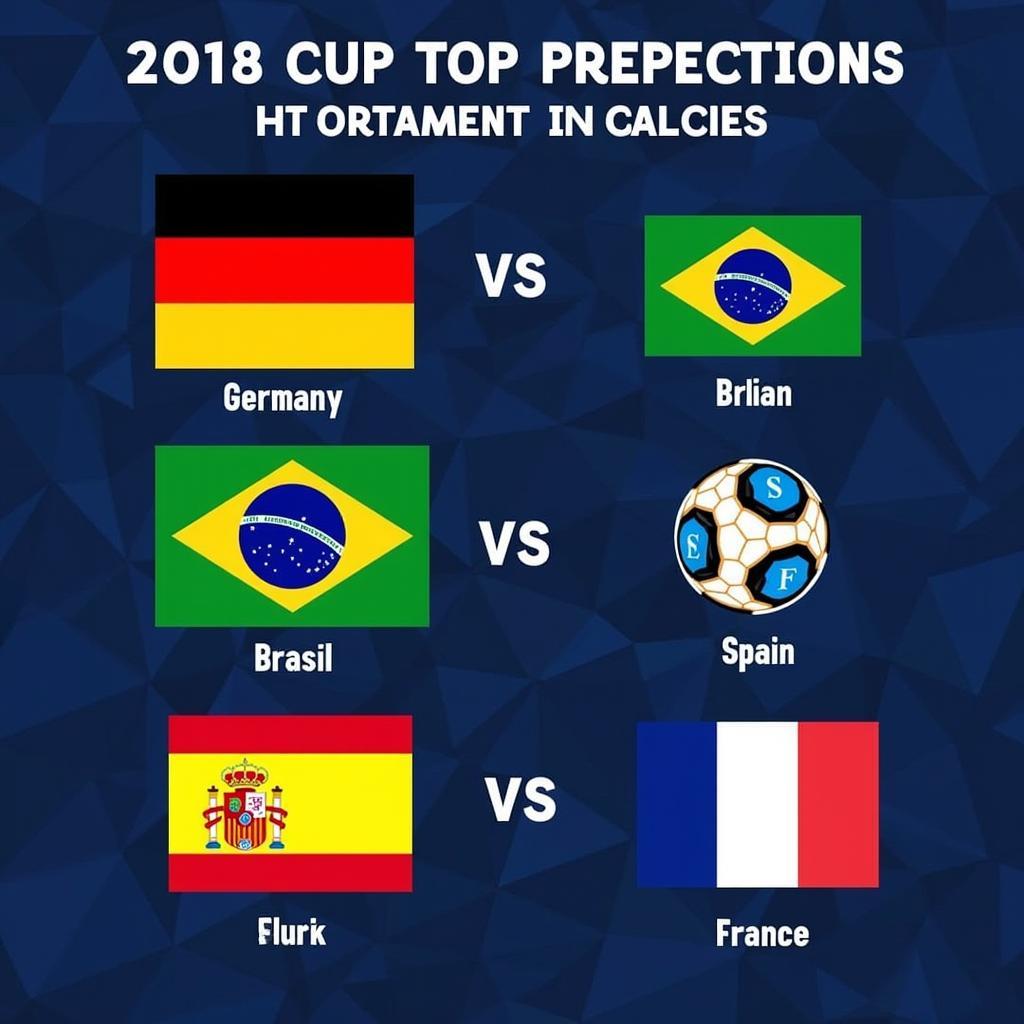Predict the World Cup 2018: A Look Back and Lessons Learned
October 30, 2024The 2018 World Cup in Russia captivated audiences worldwide, sparking countless attempts to Predict The World Cup 2018 outcome. From expert analysts to casual fans, everyone had their predictions. Looking back, we can analyze the successes, failures, and key takeaways from these predictions, offering valuable insights for future tournaments.
The Thrill of Prediction: Why We Try to Predict the World Cup 2018
Predicting the World Cup is more than just a game; it’s a testament to our love for the sport. It allows us to engage with the tournament on a deeper level, analyzing team form, player performance, and historical data. The unpredictable nature of football adds to the allure, making every match a potential upset and every prediction a gamble. Whether using sophisticated statistical models or gut feelings, we’re all drawn to the challenge of forecasting the future of the beautiful game. Even when our predict the world cup 2018 attempts fall short, the process itself is enriching.
The 2018 tournament provided ample opportunities for predictions, from group stage winners to the ultimate champion. Pre-tournament favorites like Germany, Brazil, and Spain faced stiff competition from emerging nations and dark horses. The diverse range of contenders made predicting the world cup 2018 particularly challenging, but also incredibly exciting.
 Pre-tournament favorites for the 2018 World Cup
Pre-tournament favorites for the 2018 World Cup
The Reality Check: How Accurate Were the Predictions?
While some predictions hit the mark, many fell short. The early exit of defending champions Germany sent shockwaves through the tournament, proving that even the most established teams can falter. Brazil’s quarter-final defeat also defied many predictions, highlighting the unpredictable nature of knockout football. Ultimately, France emerged victorious, a result that some predicted, but certainly not all.
Analyzing the accuracy of predictions reveals the limitations of pre-tournament analysis. Unforeseen injuries, tactical surprises, and the sheer randomness of the game can all impact the outcome. While statistical models can provide valuable insights, they can’t account for every variable. Human intuition, often influenced by bias and emotion, can also lead to inaccurate predictions.
Lessons Learned: Improving Future World Cup Predictions
The 2018 World Cup offers valuable lessons for future predictions. While pre-tournament form and historical data are important, they shouldn’t be the sole basis for predictions. Factors such as team chemistry, managerial tactics, and individual player brilliance can significantly influence a team’s performance.
“Understanding the psychological aspect of the game is crucial,” says Dr. Anya Petrova, a sports psychologist specializing in football. “A team’s mentality and resilience can be just as important as their technical skills.”
Beyond the Results: The Value of Engagement
Even with the benefit of hindsight, perfectly predicting the world cup 2018 is an impossible task. The true value lies in the engagement and discussion that predictions generate. Whether your predictions were right or wrong, the process of analyzing teams, debating outcomes, and sharing your thoughts with fellow fans enriches the World Cup experience.
“The beauty of football lies in its unpredictability,” says renowned football analyst, Javier Hernandez. “Predictions are a way to engage with that uncertainty and celebrate the passion and drama of the sport.”
 Fans celebrating during the 2018 World Cup
Fans celebrating during the 2018 World Cup
In conclusion, while accurately predicting the world cup 2018 proved challenging, the process itself fostered engagement and deeper appreciation for the beautiful game. By learning from past predictions, we can refine our approaches and enhance our enjoyment of future tournaments.
FAQ
- Who won the 2018 World Cup? France
- Where was the 2018 World Cup held? Russia
- Which team was the defending champion in 2018? Germany
- Which team caused the biggest upset in 2018? Many would say Germany’s early exit.
- How accurate were pre-tournament predictions? Varied, with many failing to predict the eventual winner.
- What factors influence World Cup results? Team form, player performance, tactics, injuries, and luck.
- What can we learn from 2018 World Cup predictions? The importance of considering factors beyond pre-tournament form and statistics.
For further support, please contact us: Phone: 0915117113, Email: fanyamal@gmail.com Or visit us at: Hamlet 3, Binh An, Phu Thuong, Vietnam, Binh Phuoc 830000, Vietnam. We have a 24/7 customer service team.